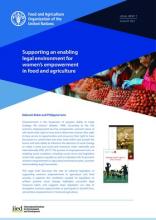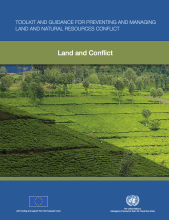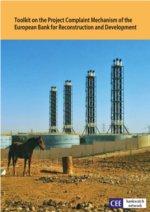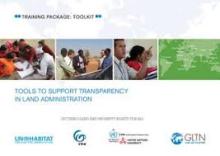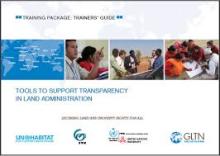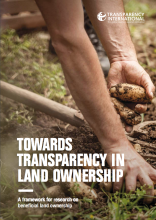Resources for Grassroots organisations
Strengthening Community Understanding of Free, Prior and Informed Consent - A Trainer's Manual
This trainer’s manual aims to help strengthen and build the capacity of community activists, community based organisations and educators to support communities to understand Free, Prior and Informed Consent (FPIC).
The objectives are: • to enable communities to demand meaningful participation in natural resource management decision-making;
• to make sure that internal community decision-making processes include all members of the community;
• to ensure that projects only go ahead if the consent of the affected community is given.
Supporting an enabling legal environment for women’s empowerment in food and agriculture
Empowerment is the “expansion of people’s ability to make strategic life choices”. According to the UN, women’s empowerment has five components: women’s sense of self-worth; their right to have and to determine choices; their right to have access to opportunities and resources; their right to have the power to control their own lives, both within and outside the home; and their ability to influence the direction of social change to create a more just social and economic order, nationally and internationally. The process of empowerment rests on enabling social conditions including social norms and legislative action that supports equality as well as individual will. To promote women’s empowerment in agriculture and food security, countries need enabling legal frameworks.
Tip Sheet for Journalists Covering the Impacts of the Coronavirus Pandemic on the Extractive Sector
This compilation of resources aims to help journalists cover the medium- to long-term impacts of the global pandemic on the governance of the oil, gas and mining industries in resource-rich countries. It includes blog posts with media-relevant resources such as good examples of existing coverage, suggested story angles and data sources.
Toolkit and Guidance for Preventing and managing Land and Natural Resources Conflict - Land and Conflcit
This guidance note provides a framework for understanding and addressing land and natural resource-related grievances and conflicts through a holistic, systematic approach. While the main emphasis is on violent conflict, it may also be useful in a variety of other situations characterized by significant land-related grievances, but which are not currently or openly violent. It is intended for staff of multilateral organisations, national and local governments, and civil society organisations.
Toolkit on the Inter-American human rights system for indigenous women
This toolkit contains a series of information notes explaining different aspects of the Inter-American human rights system. It is designed to help indigenous women and their advocates to use the system effectively.
Toolkit on the Inter-American human rights system for indigenous women
This toolkit contains a series of information notes explaining different aspects of the Inter-American human rights system. It is designed to help indigenous women and their advocates to use the system effectively.
Toolkit on the Project Complaint Mechanism of the European Bank for Reconstruction and Development
The Project Compliance Mechanism (PCM) is the EBRD's accountability mechanism for the assessment and follow-up of complaints about project financed by the bank. The PCM is a grievance mechanism for civil society, local groups and individuals that may be directly and adversely affected by a bank project. It's purpose is to help identify when the EBRD or its client has not fulfilled the obligations defined in the bank's policies and to facilitate a problem-solving process with the EBRD's client. This guide is written from the perspective of a complainant and contains useful tips for NGOs, local communities and affected individuals.
Tools to Support Transparency in Land Administration : Training Toolkit
This training toolkit aims to sensitize government agents about land administration, develop their capacity to address issues of corruption and to enhance transparency in the land sector. It focuses specifically on land administration with a view to filling the capacity development gap in the land administration sector. Training content covers key themes clustered into different training sessions related to land governance, transparency, land administration and tools that could help bring about transparency. It comes with a trainer's guide.
Tools to Support Transparency in Land Administration: Trainer's Guide
This trainer's guide is complementary to this training toolkit. It is part of an approach that aims to sensitize government agents about land administration, develop their capacity to address issues of corruption and to enhance transparency in the land sector. It focuses specifically on land administration with a view to filling the capacity development gap in the land administration sector. Training content covers key themes clustered into different training sessions related to land governance, transparency, land administration and tools that could help bring about transparency.
Towards Transparency in Land Ownership: A Framework for Research on Beneficial Land Ownership
In many countries, unidentified private individuals and legal entities obtain significant economic benefits from land. This lack of transparency can make it harder for affected communities and governments to hold them accountable for land use decision-making and any sort of violation they commit. It can also leave investors open to risk if they do not know who is truly behind a company they are doing business with.
Building on a methodology used to investigate beneficial ownership of legal entities for the purposes of fighting tax evasion, money laundering and corruption, this publication proposes a research framework for assessing a country’s regulation of beneficial ownership in large-scale land holdings.


